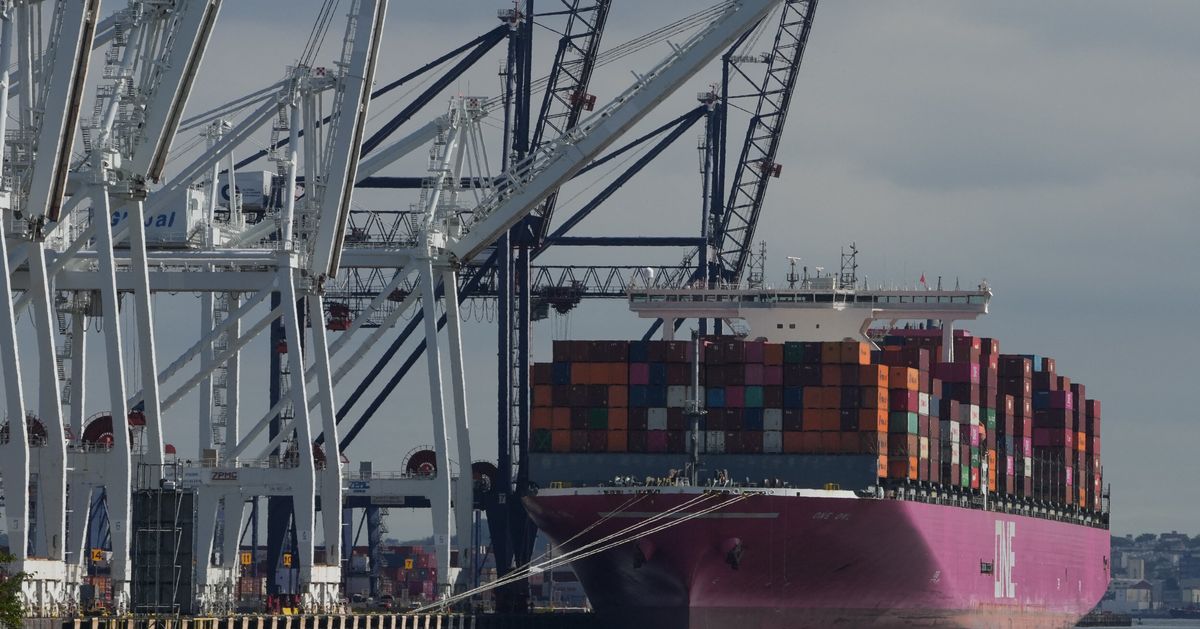Thousands of dock workers at ports along the East and Gulf coasts went on strike early Tuesday morning amid a contract dispute, halting the flow of goods with a potentially costly work stoppage.
Their union, the International Longshoremen’s Association, failed to reach a new six-year agreement with the United States Maritime Alliance, the group representing employers at ports from Maine to Texas. Workers walked off the job just as their previous contract expired.
It’s unclear how long the strike will last and how expensive it will be, but a prolonged shutdown could deal a significant blow to the economy since the workers who handle shipping containers control major commercial choke points.
The showdown also presents a political problem for President Joe Biden, who has the power to suspend the strike. Doing so would take away workers’ leverage and could hurt the union-friendly president’s relationship with organized labor.
“These people today don’t know what a strike is. … In today’s world, I’ll cripple you. I will cripple you, and you have no idea what that means.”
– Harold Daggett, ILA president
The ILA has been pushing for significant raises in its next contract. Members currently top out at a $39-per-hour\ base wage, and the union has been calling for a $5 raise in each year of the next agreement, or $30 over the full duration. The ILA also wants protections against automation at ports that it said would destroy jobs.
Harold J. Daggett, the union’s president, has accused the Maritime Alliance of making “lowball” and “insulting” proposals that members couldn’t accept and said the blame for a strike would fall “squarely on the shoulders” of employers.
He also said the ILA wouldn’t hesitate to snarl commerce, predicting that car dealers, malls and construction firms would have to lay people off because they weren’t receiving goods and materials.
“These people today don’t know what a strike is,” Daggett said in a recent video the union produced. “In today’s world, I’ll cripple you. I will cripple you, and you have no idea what that means.”
BRYAN R. SMITH via Getty Images
The Maritime Alliance has accused the union of walking away from the bargaining table. Last week, it filed charges with the National Labor Relations Board, the federal agency that referees private sector labor disputes, asking officials to pursue an injunction forcing the ILA to negotiate.
(Dock workers on the West Coast are represented by a different union that reached a new deal with employers last year, so those ports would not be affected by the ILA’s walkout.)
The Taft-Hartley Act enables the president to intervene in strikes that impact national security, requiring work to continue amid an 80-day “cooling off” period. Robyn Patterson, a White House spokesperson, said in an email that senior officials had been in touch with the Maritime Alliance over the weekend, “urging them to come to a fair agreement fairly and quickly.”
“We’ve never invoked Taft-Hartley to break a strike and are not considering doing so now,” Patterson said.
Support Free Journalism
Support HuffPost
Already contributed? Log in to hide these messages.
House Republicans had called on the White House to “utilize every authority at its disposal to ensure the continuing flow of goods” in the event of a work stoppage.
On Monday, the AFL-CIO labor federation had urged lawmakers to stay out of the dispute and not undermine port workers.
Liz Shuler, the federation’s president, said employers who can count on getting an injunction to stop a strike don’t bargain “in good faith.”
“Like all other workers, longshoremen need raises just to keep up with the cost of living,” Shuler wrote in a letter to House Republicans. “They need fair contract provisions that protect their jobs from being eliminated by automation.”
In 2022, the White House and Congress intervened to prevent a massive rail strike that could have hurt the economy — a move that injured Biden’s standing among unions.
Support Free Journalism
Support HuffPost
Already contributed? Log in to hide these messages.

